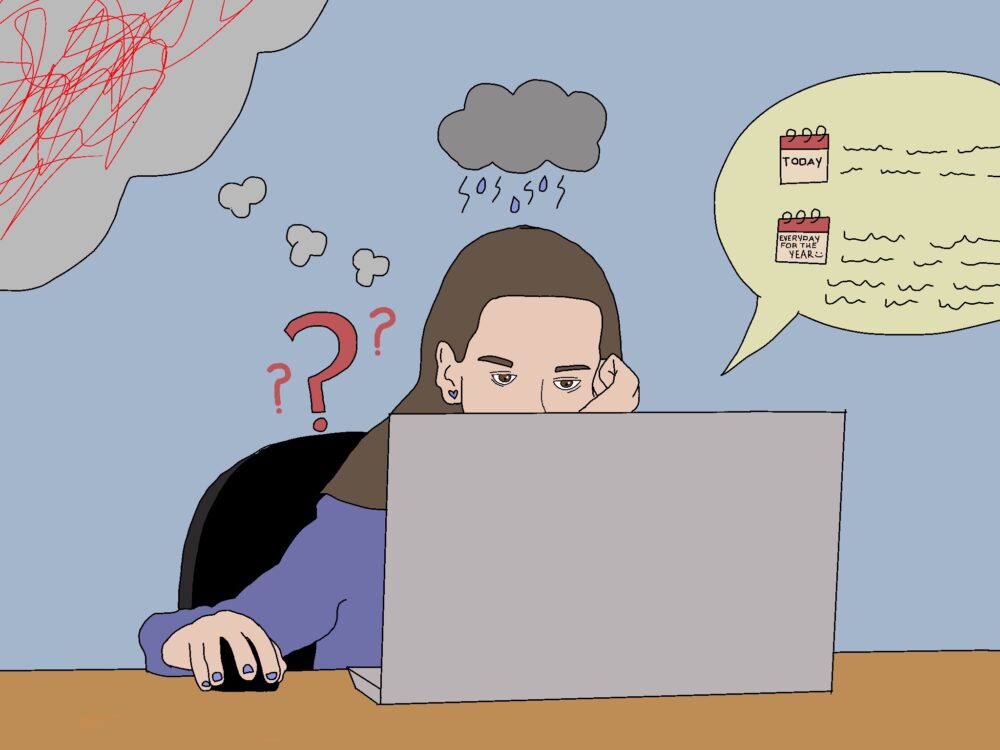
By Anneliese Duong
With distance learning, students and staff have to adjust to a new learning environment that has boundless effects, both good and bad.
Distance learning allows students to have more free time and learn at their own pace with video lessons. But at the same time, it can affect one’s sleep schedule and there can be distractions like the temptation to go on your phone rather than work.
Some students enjoy distance learning, such as sophomore Zander Sherry who said distance learning helped him work efficiently.
“I enjoy being able to do a lot more on my own and help myself progress at my own pace,” Sherry said. “Of course, I dislike being distracted more often, but the large amount of free time makes up for it.”
In Sherry’s free time, he enjoys biking, painting and making meals—some of the activities he was able to do more often since the transition to distance learning.
On the other hand, senior My Nguyen shared the challenges she faced while learning online.
“I don’t like having to learn through a screen since it’s harder to concentrate,” Nguyen said. “I’d prefer to learn in person if we were under better circumstances [and] it is much harder to engage fellow students to participate in club events and activities, even with an online alternative.”
An additional setback is the increased amount of screen time on devices. Students have to attend virtual calls for about four hours for their classes and then an estimated two or more hours afterward to do work.
To avoid headaches and back pain from sitting all day, FVHS’s psychologist Cynthia Olaya suggests we take care of ourselves by taking breaks in between assignments.
“Close your eyes, go outside and try to be in the sun. A lot of kids and adults discovered something they enjoyed doing, so be open, try new things, because you might not know what works for you until you try it,” Olaya said.
Another tip from Olaya is to interact with friends as much as possible, whether it be on social media, FaceTime or socially distanced hangouts like picnics or bike rides if permitted.
Now that school has started, students may need some more advice on how to have a balanced life. Here are some other tips to have a great and productive school year while carving free time for yourself!
- Stay organized. With online learning, documents will be all over your Google Drive, so make folders for each of your classes to easily navigate through.
- Manage your environment. Try to find an empty and quiet area that is comfortable while also allowing you to focus. You should also consider not going on your phone because you might miss important topics during meetings.
- Have a schedule. If you have a lot of things to do for the day such as extracurriculars, plan a study log ahead of time. You can use Google Sheets, a journal/notebook or even just a sheet of paper. Start by what time you wake up, your time spent “at school,” individual study times (an estimated 30 to 90 minutes each class), tests and quizzes, breaks and the time you wish to go to sleep. Creating a study log is entirely up to you, and you can decorate it however you like. With this tool, students can reduce stress, improve how they study and have a better sleep schedule.
- Communicate. Reach out to your teachers if you have any questions and check Canvas often to see updates or announcements.
- Stay active. Exercise is a great way to stay active because during these times, being in a virtual setting means sitting in the same spot for as long as six hours. Even for a little bit, exercise helps improve your mood and boost self-confidence.
- Take care of yourself. Self-care is extremely important both mentally and physically. It’s ok to take a few breaks, get a glass of water, listen to music or go on a walk for some fresh air.
- Set goals. Start with small goals like completing a homework assignment in less than two hours. Whenever you complete a goal, reward yourself! If you completed a small goal, your reward could be a snack and if you were able to complete a larger goal, treat yourself with an item or meal you’ve been wanting.
- Interact with your classes. Participation can be as simple as turning on your camera, following along or helping your classmates. It’ll help you stay engaged and on task.
For other mental health resources, contact FVHS counseling and student support staff, or check out the “Wellness” page under Students & Families on the district website at hbuhsd.edu to find mental health tips, newsletters and opportunities to request counseling.





